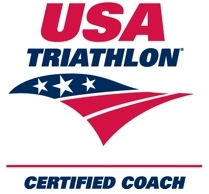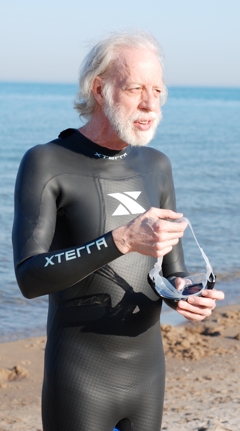
You Could Try One
How We Learn
Swim
Bike
Run
Open Water Swims
Warmup/Cooldown
Wetsuits
Tech Wear & Tri Suits
Rules
Stretching
Strength Training
Nutrition Basics
Losing Weight
Nutrition For Athletes
Race Nutrition
Race Lengths
Training, Tapering
Cramps
Creaky Knees
Gadgets
Running Shoes
Gear Checklist
Race Day
Picks & Pans
Warning Label
Marathon (the song)
Also Try Feldenkrais

Triathlon, You Could Do One
Yes, it's intimidating. No, it's not at all impossible. Not for anyone. You take it step by step, and you get there. Of course, everyone thinks of the Ironman when they think of triathlon. And yes, that's about as hard an endeavor as people have ever been able to conceive of. But that's just the Mt. Everest of the sport. There are smaller, "Sprint" and "Olympic," versions that anyone can do. Can you swim a few laps in the pool? Can you ride a bike? Can you run a few miles? There you go. You could be a triathlete. Run the word over your tongue a few times. Has a nice ring to it, doesn't it?
The beauty of triathlons is their diversity. By spreading out your training into different sports, you distribute the stress on your body. Running one day, biking the next and swimming on the third day is much less stressful than running three days in a row. And your body gets a broader workout, becoming truly fit rather than just modified to a single specialty. It's a wonderful, interesting way of life.
There is also the intellectual challenge. There is a great deal to learn if you want to do these sports well. Swimming especially is a skill - the smoother your stroke, the farther you will go with the same effort. You wouldn't think running is a skill, but it is. Doing it right can keep you running without a lot of downtime from injury. There's also the fun of planning the transitions, from swim to bike and bike to run. On race day you'd better have all your equipment ready to go and organized properly. It's like planning a military campaign.
The race starts out with the swim. In sprint triathlons the suggested distances are 750 meters for the swim, 20 kilometers for the bike and 5 kilometers for the run. There is no specific required specific distance for any of the three legs. The shortest distance I've seen for the swim was 450 yards. Even if you're a bit slow, that's only going to take maybe 10 minutes. Can you teach yourself to keep swimming laps for 10 minutes? Of course, you'll need to know how to swim properly. Don't doubt that you'll need to work on this. But ten minutes isn't all that tough. You'll notice I used the word "laps." Often the smaller races do the swim portion in a community pool. There are lanes to keep you moving in the right direction, and you won't have to deal with the panic of open water. For your first triathlon, I would strongly suggest picking a sprint that starts in a pool. Swimming in a lake or the ocean is another matter with a different level of competence needed. Suddenly the worry level increases considerably. It's also difficult to swim in a straight line, since you don't have the pool lines to guide you. When crossing a lake, I once added 50% onto the distance by zigzagging constantly. I've gotten a lot better at it over the years, but it's not easy. When competing on a lake, you need to keep tabs on what everyone else is doing and follow the "school" and have a consistent pattern for sighting to keep your bearings. One of the secrets of open water swimming is those wetsuits they wear. They actually slip through the water better than skin, and they add a modest but appreciated degree of buoyancy to your body. Sort of like sexy water wings. In open water that's comforting. For more on wetsuits click here.
Then you have to transition to the bike. Here's where the wet suit can slow you down. They can be a real drag to get off. In my very first wetsuit triathlon I lost several minutes to removing my wetsuit. It's something you have to practice in advance. Your bike equipment, of course, is all carefully laid out. Glove, helmet, shoes, remember these seconds count against you, the clock is ticking. Some have their shoes already cleated into the bike and don't strap their feet into the shoes until they're rolling. I think that's creepy, but hey, I've never won one of these things.
You don't need a fancy bike, and for your first outing any old thing will do. You must wear a helmet. If you've done your training this is the easiest part of the race. You peddle and do some hydrating. On a sprint, water taken during the run probably won't hit your system until you're about done. So now on the bike is the time to get some water in you. On a short race, you've may only have to ride that bike for perhaps 40 minutes. Peace of cake.
Then you're off the bike and slipping into your running shoes. Off you go. Except, no, you don't. This will be one of the more fascinating moments of the race. You will find you cannot run. Your legs are in a weird state as a result of the time on the bike. When you ask them to run they will feel like they're made of wood - big, heavy, wooden timbers. For the first minute you will labor. And then it will get easier. On a short race you may only have a few miles to do. If you've been doing any running at all, this is doable.
Cross the finish, and you're a triathlete.
If you haven't done much physically in recent years, I know how daunting all of this can seem. But no one is born knowing how to swim, or bike or run distances. It's a learning and conditioning process. But it's possible for anyone. I'll say this elsewhere, but I'll say it here as well. No one goes out for the first time and just runs for miles. The best marathoners of today, when they first began running, found themselves panting and having to rest after a block or two. The best swimmers when they first got in the pool were holding onto the side and resting after swimming a single lap. You should get yourself checked out by a doctor. But even if he tells you you're in horrible shape and need to be incredibly careful, that may not be a good reason not to begin. The worse your condition, the more you need to find a way to get yourself in shape. Because the body gets stronger when challenged, and weaker when not.
Being a triathlete is physically demanding, while at the same time being easy on the body. A standard triathlon takes several hours to finish. That's as long as it might take to run a marathon, yet at the finish line I have none of the horrible fatigue that comes with running for three hours. Sure, I get tired, but I have none of the physical agony of a more focused effort. It is a healthy way of life full of excitement, adventure, friends, interesting challenges and a wonderful sense of purpose.
And your perspective changes. What was once difficult becomes no big deal. You grow tired of the sprint and you decide to try an Olympic Distance tri. There's a time when a three hour workout in one day sends you to bed exhausted. And then a year later that feels normal. The body adapts. I can't say that enough. The body adapts. How far you want to go is up to you. The Ironman is formidable not so much for the day itself, but the incredible hours of training that go into preparing for it. It's exercise way beyond what you need to be healthy. And it's optional. Triathlon allows you to find the level of commitment you're comfortable with. Just begin, and you'll find your way.
I will not deny that triathlon is hard. Maybe that's why we do it. No matter how fit you are there's a distance that will leave you shocked with fatigue or just plain defeat you. Along with some modest triumphs along the way, I've also had failures. You will learn pride, but you will also be humbled. So the pages which follow are offered with great humility. I'm not a champion at this, just some old fool who finds this stuff fascinating and wants to understand it.